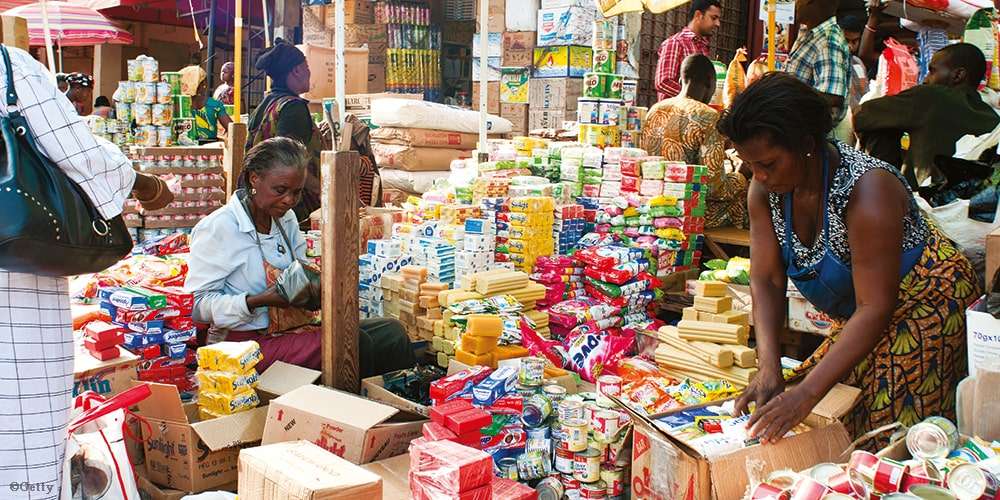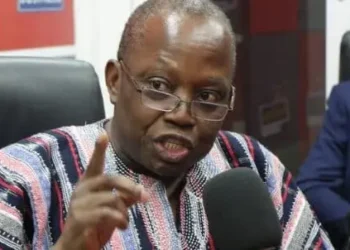As cedi appreciation continues to shape Ghana’s economic landscape, Dr. Joseph Obeng, President of the Ghana Union of Traders Association (GUTA), has made a compelling case for traders to reduce prices in a show of good faith to the consuming public.
Speaking plainly and with a sense of moral urgency, Dr. Obeng emphasized that the recent decline in the dollar-cedi exchange rate is significant—and traders cannot ignore its impact.
“We have to share the gains with the consuming public. The business that we do, we do not do it in isolation. We do it with the consuming public. If the consumer is unable to buy because of high prices, it also curtails our business, our ability even to turn over, be able to pay the banks, and all that. It is in our own interest that prices come down so that we can do business where the purchasing power of our consumers has been enhanced.”
Dr. Joseph Obeng
Dr. Obeng’s remarks come at a pivotal time, as Ghanaians increasingly call for price cuts in response to the strengthening cedi. His appeal goes beyond mere economics—it carries a moral undertone.
While he acknowledged traders’ desire to recover past financial setbacks, he emphasized the need to “transfer some of the gains to the consuming public.”

This perspective resonates deeply, especially considering how consumers have long borne the brunt of inflation and erratic exchange rates—factors frequently used to justify rising prices. Now that the cedi is rebounding, the public expects traders to reverse course.
Dr. Obeng admitted that some merchants may prefer to wait for assurance that the cedi’s gains are stable, but he stressed that benefits are already evident.
However, he pointed out that dollar-linked port duties have fallen, and currency conversion is now less costly. “So, definitely we have some gain,” he noted, adding that this is precisely the moment for traders to reciprocate with price relief.
GUTA Expects Cedi Gains To Reflect
Beyond the economic rationale, Dr. Obeng believes good faith action by traders could empower them in future negotiations with the government. He cited electricity tariffs as an example.
The recent increase in ECG bills, justified partly by exchange rate concerns, now appears unjustifiable given the cedi appreciation.

“There was no justification for us to increase the ECG bills,” he lamented, calling out the Public Utilities Regulatory Commission (PURC) for poor judgment.
For GUTA, the moment demands both pragmatism and principle. Dr. Obeng said his organization is urging members to reevaluate their prices, even though he concedes it’s not a straightforward decision.
Some traders, he explained, still carry stock purchased at higher rates. “Sometimes we have to scratch reasonable averages so that we can remain in business.”
The Ghanaian market, he noted, is far from monopolistic. It is hyper-competitive, with thousands of sellers dealing in the same products.
“If you do not adjust your prices and you overprice yourself at this particular time, you will overprice yourself out of the market. Especially if your goods are perishable.
“So the prudence here is for you to adjust to the trend so that you can still remain in competition. We are just appealing… cost is varying, and you cannot actually force anybody to adjust.”
Dr. Joseph Obeng
Dr. Obeng’s message is clear: price reductions aren’t just a public favor—they’re good business. But he was also quick to point out the limits of what GUTA or the government can enforce.

Calls for price regulation, he said, are unrealistic and outdated. “Not even socialist countries can do price control,” he stated firmly, referencing failed attempts in Ghana’s past, such as during the Acheampong era, when price controls led to hoarding, smuggling, and black market schemes like “Kalabule.”
He dismissed price control mechanisms as obsolete. “Nobody can actually control the prices at which people sell their goods,” he said. The role of GUTA, in his view, is not to dictate prices but to appeal to traders’ sense of fairness and long-term viability.
Dr. Obeng emphasized that his outreach to traders is aimed at fostering trust and confidence among consumers. By encouraging voluntary price reductions, he hopes to create a climate where future price increases, when justified, are met with understanding rather than backlash.
He also underscored the influence of consumers in shaping market behavior. In a buyer-driven economy, shoppers can promote accountability by favoring reasonably priced goods and sidelining overpriced ones.
This organic market force, he argued, is far more effective than any form of government-imposed price control.
Ultimately, the cedi’s recent gains offer a rare chance to recalibrate the relationship between traders and the public.
With genuine action from traders, this moment could rebuild consumer trust, enhance economic stability, and dispel the lingering doubt around pricing transparency. For now, the responsibility lies squarely with the business community.
READ ALSO: S&P Upgrades Ghana’s Credit Rating to ‘CCC+’ Amid Debt Restructuring Progress



















